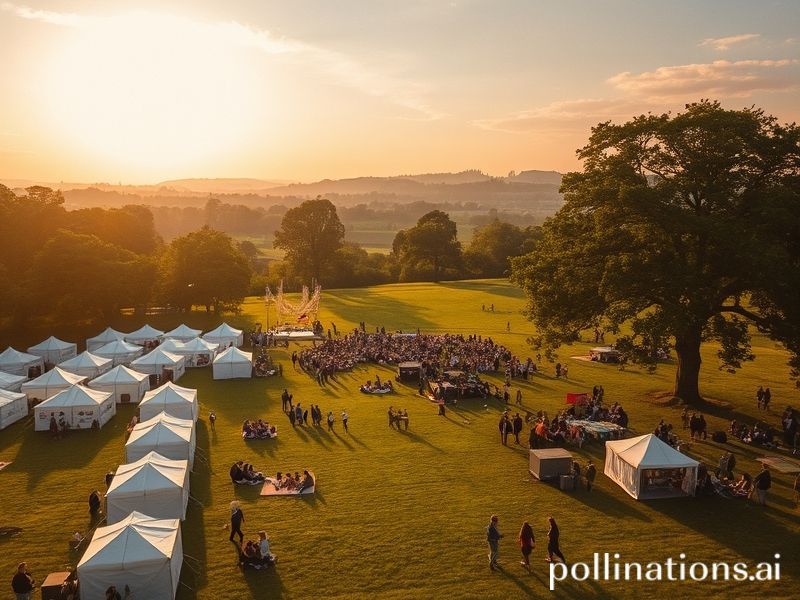Roundhay Festival: How Leeds Parties While the Planet Panics
Roundhay Festival: Leeds’ Leafy Rebellion Against the End of the World
By Our Man in the Beer Tent, Nursing a Warm IPA and Existential Dread
Roundhay Park, Leeds—While COP negotiators in distant time zones bicker over commas in climate communiqués, 70,000 Brits have decided that the most rational response to civilizational collapse is to picnic under lime trees and watch Tom Grennan yell about heartbreak. Welcome to the Roundhay Festival, a three-day pastoral hallucination that proves the United Kingdom’s talent for ignoring geopolitical weather forecasts with a stiff upper lip and a plastic glass of £7 cider.
To the untrained eye, this is just another green-space jamboree in a country that treats open-air concerts like constitutional rights. Yet, peer through the haze of disposable vape smoke and you’ll spot the true international significance: Roundhay has become a pop-up laboratory for how late-capitalist societies cope when reality goes off-script. Delegations from Berlin, Seoul and São Paulo have been spotted taking notes, presumably studying how to monetise denial at scale. If Davos is where the world scripts its impending doom, Roundhay is where it whistles past the graveyard—off-key, slightly sunburnt, and wholly committed to the chorus.
Global Context, or Why the Japanese Tourists Look Confused
The festival’s timing is exquisite. It lands precisely as the Northern Hemisphere registers its hottest June since records began, the Arctic posts a cheery Instagram of melting permafrost, and the Bank of England quietly revises food-price inflation to “eye-watering.” Against this backdrop, the decision to erect a neon-lit funfair and a “VIP prosecco garden” feels less like escapism and more like curated satire. When the world’s on fire, you may as well roast marshmallows.
Overheard in the queue for overpriced pizza: “Mate, if we’re going down, we’re going down to a house remix of ‘Mr. Brightside.’” There, in 14 words, is the entire Global North’s coping strategy.
Soft Power in a Hard Place
The British Council—yes, the same people who once exported Shakespeare and now export Love Island—has begun promoting Roundhay as a model of “cultural resilience.” Translation: if you can’t fix the grid, at least teach people to form orderly lines for falafel. The festival’s carbon footprint is officially “offset” through a scheme that plants trees somewhere vague and rhymes with “Latvia,” a place organisers admit they couldn’t find on a map even after three Aperol spritzes.
Meanwhile, the Global South watches with the weary amusement of a sibling who’s already had their allowance docked. Ghanaian climate activist Ama Serwah, invited to speak on the “Eco-Stage” sponsored by a budget airline, delivered a speech so blisteringly honest that the sound engineers cut her mic for “technical reasons.” She later told me, “They wanted hope wrapped in merch. I gave them receipts.”
The Economy of Distraction
Economists calculate the festival pours £12 million into Leeds—roughly the cost of one medium-sized arms deal, but infinitely more Instagrammable. Every falafel wrap, every branded bucket hat, every Uber surge after midnight is a tiny act of fiscal necromancy: keeping the corpse of consumer confidence twitching for one more chorus. International chains eye the margins like vultures circling a hen party that’s lost a heel.
Security, too, is globalized. A polite detachment of ex-military contractors patrols the perimeter, fresh from tours in places where festivals end with actual fireworks. They wear pastel polo shirts to look “approachable,” but the earpieces give them away. One confided, “This is the safest postcode in Yorkshire—unless you count the cholesterol.”
Closing Time—Last Call for Denial
By Sunday evening, the field resembles a dystopian collage: abandoned wellies forming plastic Stonehenges, biodegradable glitter clinging to tears, and the faint smell of existential dread undercut with chip-vinegar. The headliners thank “every single one of you beautiful souls,” which is festival-speak for “we’ll see you in traffic.” Attendees shuffle toward shuttle buses, already doom-scrolling headlines about heat domes and currency slides.
And yet, somewhere between the discarded wristbands and the distant hum of cleanup tractors, a consensus emerges: if the apocalypse insists on arriving, it could do worse than a sound track curated by BBC Radio 1. The Roundhay Festival may not save the world, but it has perfected the art of dying in style—preferably face-down in a biodegradable poncho, humming the bassline of a song whose lyrics nobody actually knows.
The planet may be on the guest list, but it’s stuck outside the fence, politely asking security if it can bring its own water.







